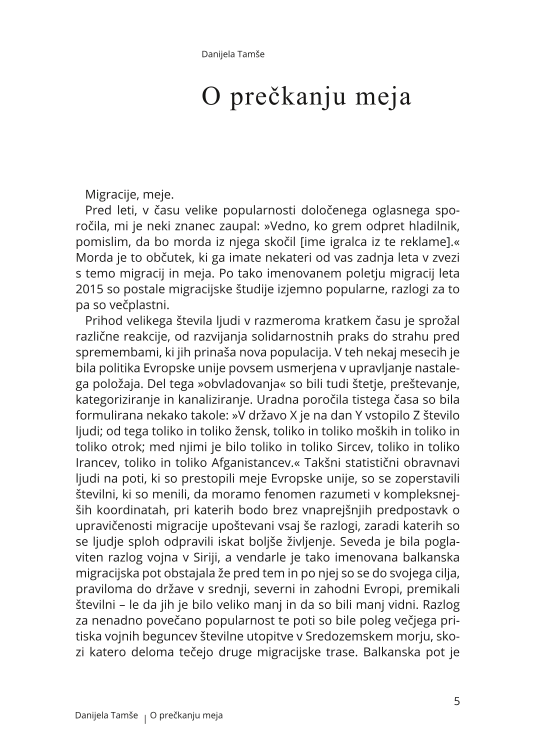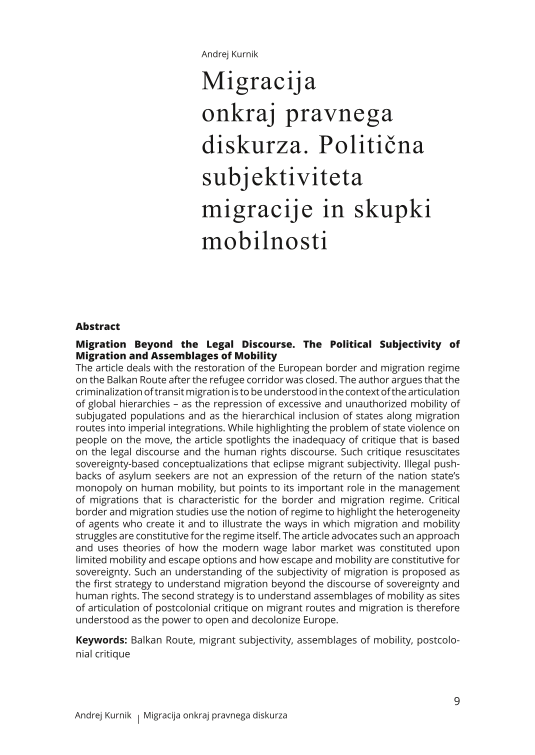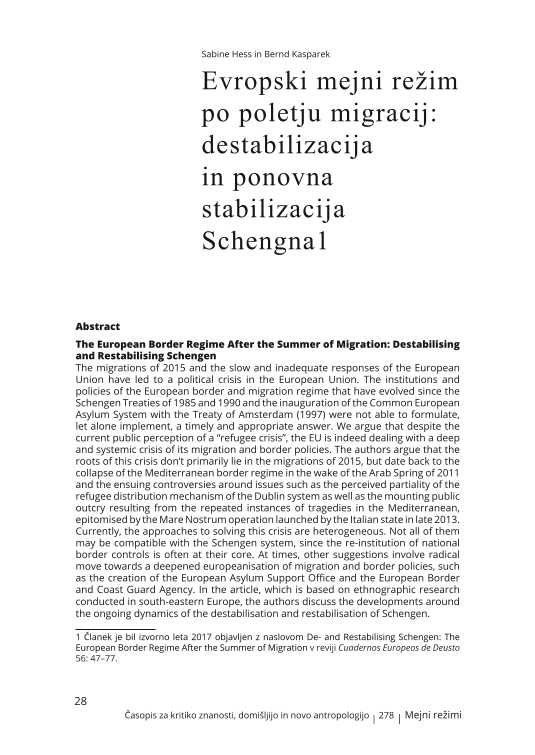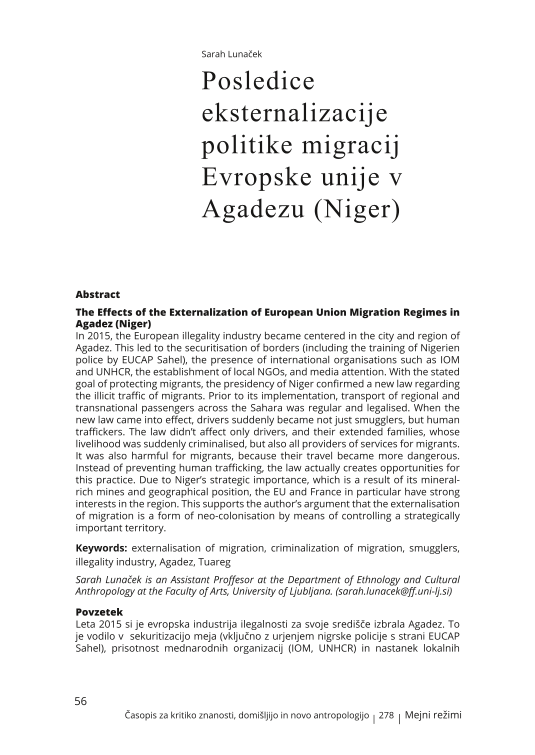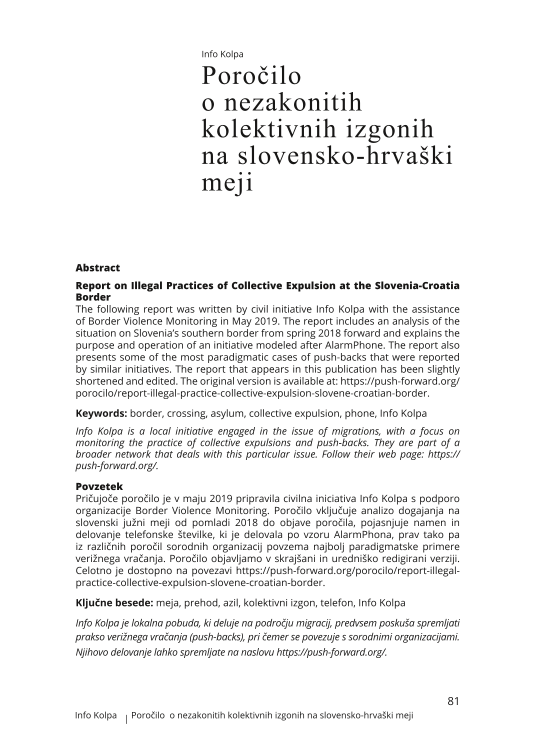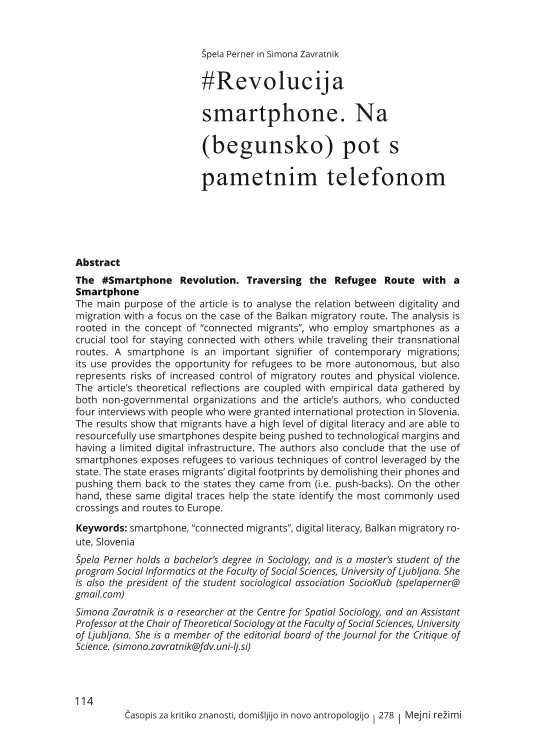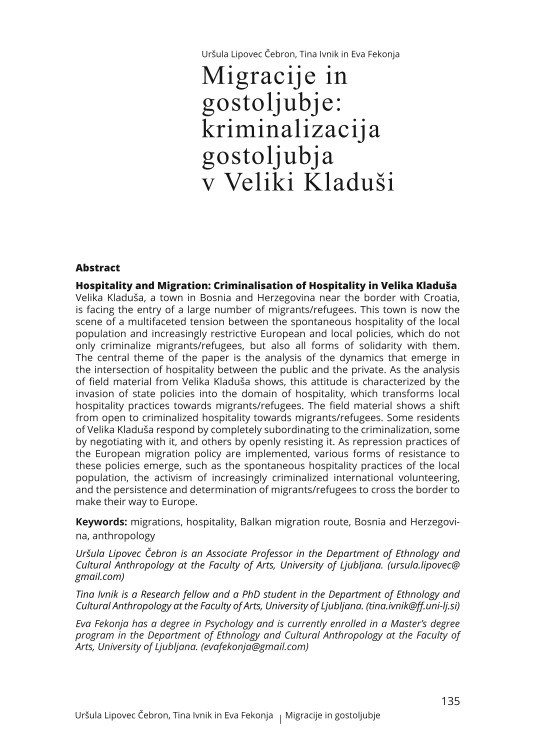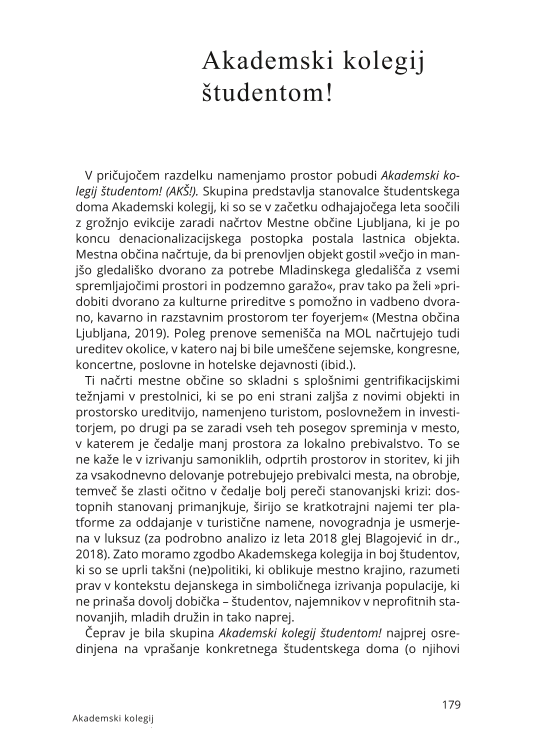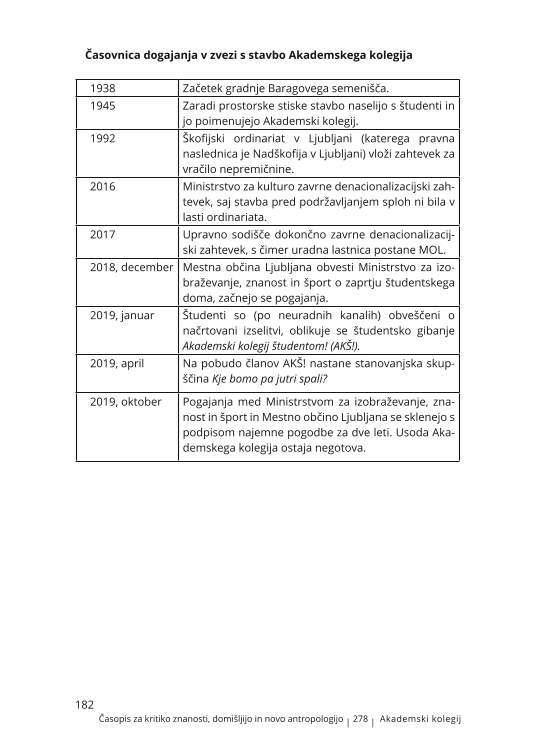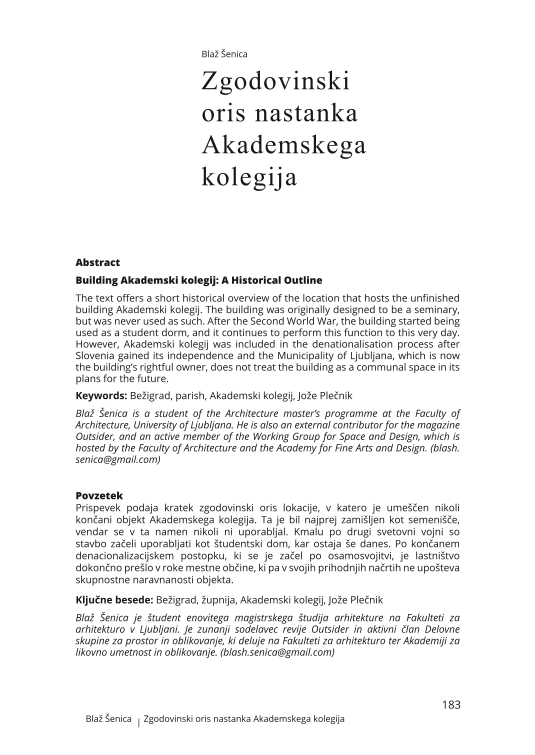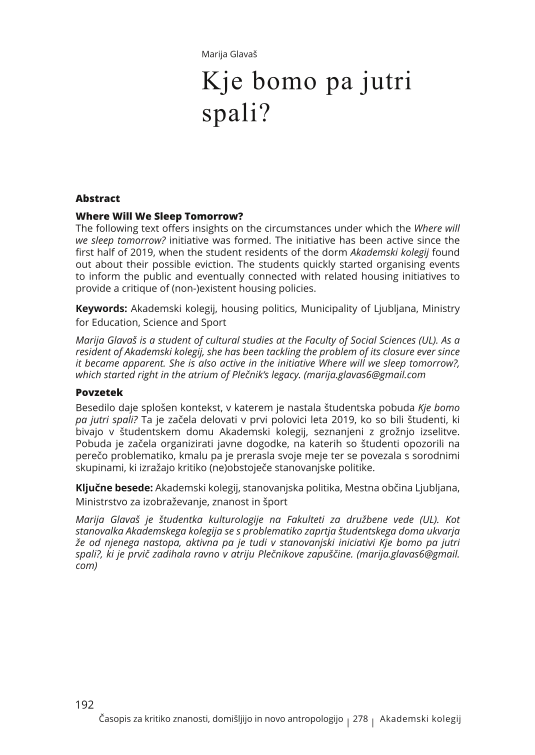Migracije, meje.
Pred leti, v času velike popularnosti določenega oglasnega sporočila, mi je neki znanec zaupal: »Vedno, ko grem odpret hladilnik, pomislim, da bo morda iz njega skočil [ime igralca iz te reklame].« Morda je to občutek, ki ga imate nekateri od vas zadnja leta v zvezi s temo migracij in meja. Po tako imenovanem poletju migracij leta 2015 so postale migracijske študije izjemno popularne, razlogi za to pa so večplastni.
Prihod velikega števila ljudi v razmeroma kratkem času je sprožal različne reakcije, od razvijanja solidarnostnih praks do strahu pred spremembami, ki jih prinaša nova populacija. V teh nekaj mesecih je bila politika Evropske unije povsem usmerjena v upravljanje nastalega položaja. Del tega »obvladovanja« so bili tudi štetje, preštevanje, kategoriziranje in kanaliziranje. Uradna poročila tistega časa so bila formulirana nekako takole: »V državo X je na dan Y vstopilo Z število ljudi; od tega toliko in toliko žensk, toliko in toliko moških in toliko in toliko otrok; med njimi je bilo toliko in toliko Sircev, toliko in toliko Irancev, toliko in toliko Afganistancev.« Takšni statistični obravnavi ljudi na poti, ki so prestopili meje Evropske unije, so se zoperstavili številni, ki so menili, da moramo fenomen razumeti v kompleksnejših koordinatah, pri katerih bodo brez vnaprejšnjih predpostavk o upravičenosti migracije upoštevani vsaj še razlogi, zaradi katerih so se ljudje sploh odpravili iskat boljše življenje. Seveda je bila poglaviten razlog vojna v Siriji, a vendarle je tako imenovana balkanska migracijska pot obstajala že pred tem in po njej so se do svojega cilja, praviloma do države v srednji, severni in zahodni Evropi, premikali številni – le da jih je bilo veliko manj in da so bili manj vidni. Razlog za nenadno povečano popularnost te poti so bile poleg večjega pritiska vojnih beguncev številne utopitve v Sredozemskem morju, skozi katero deloma tečejo druge migracijske trase. Balkanska pot je
tako obveljala za varnejšo alternativo, četudi je na njej treba za dosego schengenskega območja prestopiti več državnih meja. Razcvet migracijskih študij moramo razumeti v tem kontekstu: kot poskuse kompleksnejšega razumevanja nastalega položaja.
The article deals with the restoration of the European border and migration regime on the Balkan Route after the refugee corridor was closed. The author argues that the criminalization of transit migration is to be understood in the context of the articulation of global hierarchies – as the repression of excessive and unauthorized mobility of subjugated populations and as the hierarchical inclusion of states along migration routes into imperial integrations. While highlighting the problem of state violence on people on the move, the article spotlights the inadequacy of critique that is based on the legal discourse and the human rights discourse. Such critique resuscitates sovereignty-based conceptualizations that eclipse migrant subjectivity. Illegal push-backs of asylum seekers are not an expression of the return of the nation state’s monopoly on human mobility, but points to its important role in the management of migrations that is characteristic for the border and migration regime. Critical border and migration studies use the notion of regime to highlight the heterogeneity of agents who create it and to illustrate the ways in which migration and mobility struggles are constitutive for the regime itself. The article advocates such an approach and uses theories of how the modern wage labor market was constituted upon limited mobility and escape options and how escape and mobility are constitutive for sovereignty. Such an understanding of the subjectivity of migration is proposed as the first strategy to understand migration beyond the discourse of sovereignty and human rights. The second strategy is to understand assemblages of mobility as sites of articulation of postcolonial critique on migrant routes and migration is therefore understood as the power to open and decolonize Europe.
The European Border Regime After the Summer of Migration: Destabilising and Restabilising Schengen
(
The migrations of 2015 and the slow and inadequate responses of the European Union have led to a political crisis in the European Union. The institutions and policies of the European border and migration regime that have evolved since the Schengen Treaties of 1985 and 1990 and the inauguration of the Common European Asylum System with the Treaty of Amsterdam (1997) were not able to formulate, let alone implement, a timely and appropriate answer. We argue that despite the current public perception of a “refugee crisis”, the EU is indeed dealing with a deep and systemic crisis of its migration and border policies. The authors argue that the roots of this crisis don’t primarily lie in the migrations of 2015, but date back to the collapse of the Mediterranean border regime in the wake of the Arab Spring of 2011 and the ensuing controversies around issues such as the perceived partiality of the refugee distribution mechanism of the Dublin system as well as the mounting public outcry resulting from the repeated instances of tragedies in the Mediterranean, epitomised by the Mare Nostrum operation launched by the Italian state in late 2013. Currently, the approaches to solving this crisis are heterogeneous. Not all of them may be compatible with the Schengen system, since the re-institution of national border controls is often at their core. At times, other suggestions involve radical move towards a deepened europeanisation of migration and border policies, such as the creation of the European Asylum Support Office and the European Border and Coast Guard Agency. In the article, which is based on ethnographic research conducted in south-eastern Europe, the authors discuss the developments around the ongoing dynamics of the destabilisation and restabilisation of Schengen.
The Effects of the Externalization of European Union Migration Regimes in Agadez (Niger)
(
In 2015, the European illegality industry became centered in the city and region of Agadez. This led to the securitisation of borders (including the training of Nigerien police by EUCAP Sahel), the presence of international organisations such as IOM and UNHCR, the establishment of local NGOs, and media attention. With the stated goal of protecting migrants, the presidency of Niger confirmed a new law regarding the illicit traffic of migrants. Prior to its implementation, transport of regional and transnational passengers across the Sahara was regular and legalised. When the new law came into effect, drivers suddenly became not just smugglers, but human traffickers. The law didn’t affect only drivers, and their extended families, whose livelihood was suddenly criminalised, but also all providers of services for migrants. It was also harmful for migrants, because their travel became more dangerous. Instead of preventing human trafficking, the law actually creates opportunities for this practice. Due to Niger’s strategic importance, which is a result of its mineral-rich mines and geographical position, the EU and France in particular have strong interests in the region. This supports the author’s argument that the externalisation of migration is a form of neo-colonisation by means of controlling a strategically important territory.
The following report was written by civil initiative Info Kolpa with the assistance of Border Violence Monitoring in May 2019. The report includes an analysis of the situation on Slovenia’s southern border from spring 2018 forward and explains the purpose and operation of an initiative modeled after AlarmPhone. The report also presents some of the most paradigmatic cases of push-backs that were reported by similar initiatives. The report that appears in this publication has been slightly shortened and edited. The original version is available at: https://push-forward.org/porocilo/report-illegalpractice-collective-expulsion-slovene-croatian-border.
The main purpose of the article is to analyse the relation between digitality and migration with a focus on the case of the Balkan migratory route. The analysis is rooted in the concept of “connected migrants”, who employ smartphones as a crucial tool for staying connected with others while traveling their transnational routes. A smartphone is an important signifier of contemporary migrations; its use provides the opportunity for refugees to be more autonomous, but also represents risks of increased control of migratory routes and physical violence. The article’s theoretical reflections are coupled with empirical data gathered by both non-governmental organizations and the article’s authors, who conducted four interviews with people who were granted international protection in Slovenia. The results show that migrants have a high level of digital literacy and are able to resourcefully use smartphones despite being pushed to technological margins and having a limited digital infrastructure. The authors also conclude that the use of smartphones exposes refugees to various techniques of control leveraged by the state. The state erases migrants’ digital footprints by demolishing their phones and pushing them back to the states they came from (i.e. push-backs). On the other hand, these same digital traces help the state identify the most commonly used crossings and routes to Europe.
Velika Kladuša, a town in Bosnia and Herzegovina near the border with Croatia, is facing the entry of a large number of migrants/refugees. This town is now the scene of a multifaceted tension between the spontaneous hospitality of the local population and increasingly restrictive European and local policies, which do not only criminalize migrants/refugees, but also all forms of solidarity with them. The central theme of the paper is the analysis of the dynamics that emerge in the intersection of hospitality between the public and the private. As the analysis of field material from Velika Kladuša shows, this attitude is characterized by the invasion of state policies into the domain of hospitality, which transforms local hospitality practices towards migrants/refugees. The field material shows a shift from open to criminalized hospitality towards migrants/refugees. Some residents of Velika Kladuša respond by completely subordinating to the criminalization, some by negotiating with it, and others by openly resisting it. As repression practices of the European migration policy are implemented, various forms of resistance to these policies emerge, such as the spontaneous hospitality practices of the local population, the activism of increasingly criminalized international volunteering, and the persistence and determination of migrants/refugees to cross the border to make their way to Europe.
In the interview, Andrej Grubačić explains his engagement in Rojava, where he was involved with the local university and community. Grubačić’s activities are also related to the consciousness-raising campaign about the current situation in this region. The interview also includes a discussion on his theoretical background and syntheses.
V pričujočem razdelku namenjamo prostor pobudi Akademski kolegij študentom! (AKŠ!). Skupina predstavlja stanovalce študentskega doma Akademski kolegij, ki so se v začetku odhajajočega leta soočili z grožnjo evikcije zaradi načrtov Mestne občine Ljubljana, ki je po koncu denacionalizacijskega postopka postala lastnica objekta. Mestna občina načrtuje, da bi prenovljen objekt gostil »večjo in manjšo gledališko dvorano za potrebe Mladinskega gledališča z vsemi spremljajočimi prostori in podzemno garažo«, prav tako pa želi »pridobiti dvorano za kulturne prireditve s pomožno in vadbeno dvorano, kavarno in razstavnim prostorom ter foyerjem« (Mestna občina Ljubljana, 2019). Poleg prenove semenišča na MOL načrtujejo tudi ureditev okolice, v katero naj bi bile umeščene sejemske, kongresne, koncertne, poslovne in hotelske dejavnosti (ibid.).
A Timeline of the Akademski kolegij Building 183 Blaž Šenica: Building Akademski kolegij: A Histor
(
1938 - Začetek gradnje Baragovega semenišča.
1945 - Zaradi prostorske stiske stavbo naselijo s študenti in jo poimenujejo Akademski kolegij.
1992 - Škofijski ordinariat v Ljubljani (katerega pravna naslednica je Nadškofija v Ljubljani) vloži zahtevek za vračilo nepremičnine.
2016 - Ministrstvo za kulturo zavrne denacionalizacijski zahtevek, saj stavba pred podržavljanjem sploh ni bila v lasti ordinariata.
The text offers a short historical overview of the location that hosts the unfinished building Akademski kolegij. The building was originally designed to be a seminary, but was never used as such. After the Second World War, the building started being used as a student dorm, and it continues to perform this function to this very day. However, Akademski kolegij was included in the denationalisation process after Slovenia gained its independence and the Municipality of Ljubljana, which is now the building’s rightful owner, does not treat the building as a communal space in its plans for the future.
The following text offers insights on the circumstances under which the Where will we sleep tomorrow? initiative was formed. The initiative has been active since the first half of 2019, when the student residents of the dorm Akademski kolegij found out about their possible eviction. The students quickly started organising events to inform the public and eventually connected with related housing initiatives to provide a critique of (non-)existent housing policies.




